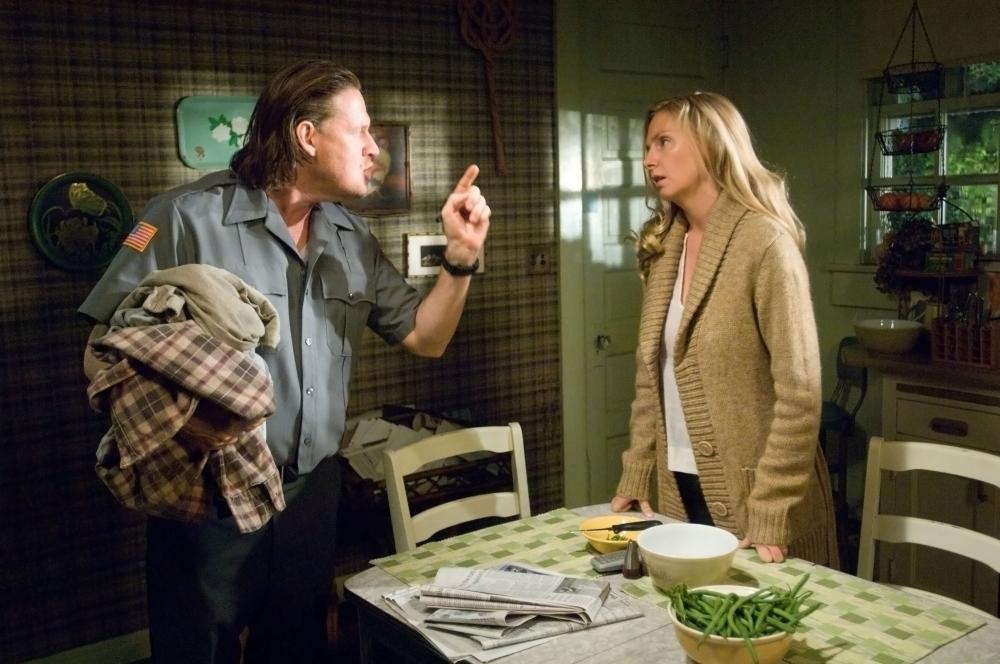The Lodger (2009)

David Ondaatje (if the last name sounds familiar, it’s because he’s the nephew of famous novelist Michael) writes and directs (his first attempt at both) this throwback thriller based on the Marie Belloc Londes novella, which had originally been done by the Master of Suspense himself back in 1927, Alfred Hitchcock. It’s not a remake of the silent film, but a very loose adaptation of the book set in modern times employing a poorly-executed and misconceived Hitchcockian directorial style.
There are two basic storylines that end up merging during the course of the film, set in West Hollywood, California. The first deals with an unhappily married housewife (Davis, The Weather Man) left alone while her neglectful husband (Logue, Ghost Rider) goes out with his buddies, while they’re both struggling to stay afloat financially. After unsuccessfully trying for weeks, they end up renting out the room to a mysterious lodger (Baker, Sex and Death 101) who wants nothing more than to be left alone. The second deals with a homicide detective (Molina, The Da Vinci Code), whose personal life is a shambles due to dealing with a suicidal wife and contentious daughter (Cook, Nancy Drew), trying to crack down a serial killer who is mimicking the style of killings after the infamous Jack the Ripper.
The most curious aspect of The Lodger is how so many recognizable and talented character actors had chosen to sign on to such a derivative and largely nonsensical vehicle. Not that it is the fault of the actors as to the outcome, as they have all been much better in other films. The reason why The Lodger ultimately doesn’t work falls squarely on Ondaatje’s shoulders. Ondaatje has it in his mind from the outset that he intends to make his serial killer film in the style of an Alfred Hitchcock film, but outside of a handful of examples of visual homage to the Master’s signature shots (a dolly in/zoom out shot recalls Vertigo for example), this lesser experienced director struggles to find the right tone or basic set-up to just about any scene in the film.
Suspense cannot be achieved without some sort of narrative momentum, and that momentum can’t be achieved without a rooted interest in the mystery that is at the heart of the film. Alas, like many modern thrillers, the identity of the killer is kept under wraps until the end, with just about every character set up to have done it, which, if you’ve seen one or two thrillers within the last 15 years, will mean that you can expect it to be the person least expected. Ondaatje does put a little twist at the end with a surprise epilogue (which feels more like a Brian De Palma handling of Hitchcock than Hitchcock himself), but both the false end and the real end make little sense with the actual events we’ve witnessed from the beginning of the story, leading the entire film as nothing but a tease to try to full the audience as to the identity of the killer, rather than tell a story that is interesting independent of the mystery or characters we might enjoy following as anything other than red herrings.
The stylish flourishes are amateurishly handled. Classical music and opera are played over maudlin scenes as if to create a feel that we’re witnessing some sort of Greek tragedy played out in modern times, but the vibe never quite matches the action on the screen. Strobe effects, sped up film, and obvious symbolic cues also manage to detract our attention to the director’s attempts to instill suspense rather than absorbing us into a story. The trick to being a great suspense director is to reel in the viewer to the story before applying the virtuoso sweeps and edits, but Ondaatje starts with the visual and auditory trickery before we even know what’s going on, and it impedes our ability to ever get a good feel for the characterizations or plot.
Although rated R (and deservedly so), most of the violence is left to the imagination. It’s not scary, though a bit gruesome in parts when dealing with autopsy discussions or pictures of the victims of the historic Jack the Ripper. Perhaps the movie itself may be more interesting to those who are obsessed with the Ripper murders, as there are frequent allusions to the unsolved murder case, but the film doesn’t reveal anything new. The staging of scenes are awkwardly handled, and the lack of quality lighting and good film stock make the movie feel much more like a cheapie B-movie than an independent feature that would carry such a talented cast.
Despite being nearly a century old and a silent, B&W film with no gore, Hitchcock’s The Lodger provides fare more entertainment value and suspense than this patchwork of lifted ideas that lack the visionary behind them to pull off to success. I’ve grown to find these “red herring” films tedious, as entire scenes and characters are created for no other purpose than o throw us off of the scent of the identity of the killer. At the end of the film, you will likely be surprised, but eventually frustrated by the fact that you’re left with far more questions than answers. That, and the whole story being little more than a meaningless tease will only leave you feeling like you’ve wasted 90+ minutes of your time.
Just like a real-life lodger shown a dilapidated hovel, don’t rent it — just move on to something better,
Qwipster’s rating: D
MPAA Rated: R for violent content, language and brief nudity
Running time: 96 min.
Cast: Alfred Molina, Hope Davis, Shane West, Donal Logue, Simon Baker, Philip Baker Hall, Rachel Leigh Cook, Rebecca Pidgeon
Director: David Ondaatje
Screenplay: David Ondaatje (based on the book by Marie Belloc Lowndes)
